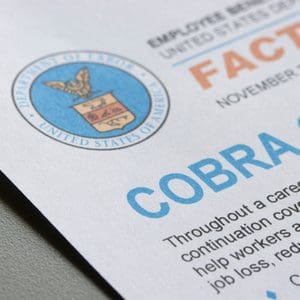
The Consolidated Omnibus Budget Reconciliation Act of 1985 (COBRA) allows employees who experience a qualifying event to change or continue their coverage under the employer-sponsored group health plan. Qualifying events include job termination, a reduction in hours, or personal life changes such as marriage, divorce, or the birth of a child, among others.
Tax-advantaged healthcare benefit accounts – including Health Savings Accounts (HSAs), Health Reimbursement Arrangements (HRAs), and Flexible Spending Accounts (FSAs) – help employees save money on eligible healthcare expenses.
So how does COBRA continuation coverage work with healthcare benefit accounts such as HSAs, HRAs, and FSAs?
COBRA and Health Savings Accounts (HSA)
HSA accounts are portable. Owned by the employee, not by the employer, they go with the employee after termination. The employee can use their account balance after termination whether or not COBRA continuation coverage is elected.
Since an HSA is not considered a medical plan, it is not covered by COBRA. Employers who make contributions to the HSA accounts of active employees do not have to continue making contributions to the HSA accounts of terminated employees.
Individuals can continue making contributions to their HSA as long as they are enrolled in a qualified High Deductible Health Plan (HDHP). HSA funds can also be used to pay the premiums for COBRA coverage.
COBRA and Health Reimbursement Arrangements (HRA)
HRAs on the other hand are considered to be self-insured medical plans. For that reason, the sponsoring employer is required to offer them to terminated employees (also known as “qualified beneficiaries”) who elect COBRA continuation coverage.
A COBRA beneficiary can elect the HRA as part of their COBRA continuation coverage. By paying a monthly premium for the HRA, the terminated employee gets to continue using the account for qualified expenses. They also get access to any future increases in HRA benefits that may take place while they are enrolled. The premium amount is calculated by the employer, using methods approved by the Internal Revenue Service (IRS).
Whether or not a COBRA beneficiary can use HRA funds to pay COBRA premiums depends on the employer’s HRA plan. Some plans allow this, and some do not. This information can be found in the summary plan description (SPD) or by contacting the employer’s benefits administrator.
COBRA and Flexible Spending Accounts (FSA)
An employee who has an FSA balance may want to continue the plan after leaving their job. FSA accounts are owned by the sponsoring employer, so any unused balance goes to the employer. Since they are considered to be medical plans, FSAs must be offered as part of COBRA continuation coverage. There is an exception, though. If the employee has already been reimbursed more from the FSA account than they paid into it before leaving the company, the employer is not required to extend COBRA rights to the FSA.
Unlike HSAs and some HRAs, FSA funds cannot be used to pay COBRA premiums under any circumstance.
For More Information
To learn more about COBRA, refer to these U.S. Department of Labor (DOL) guides:
An Employer’s Guide to Group Health Continuation Coverage Under COBRA
An Employee’s Guide to Health Benefits Under COBRA
For more information on tax-advantaged benefit plans, refer to these IRS publications and notices:
Publication 969, Health Savings Accounts and Other Tax-Favored Health Plans
Notice 2002-45, Health Reimbursement Arrangements Part III – Administrative, Procedural, and Miscellaneous
Notice 2015-87, Further Guidance on the Application of the Group Health Plan Market Reform Provisions of the Affordable Care Act (ACA) to Employer-Provided Health Coverage and Certain Other ACA Provisions
For 40 years, DataPath has been a pivotal force in the employee benefits, financial services, and insurance industries. The company’s flagship DataPath Summit platform offers an integrated solution for managing CDH, HSA, Well-Being, COBRA, and Billing. Through its partnership with Accelergent Growth Solutions, DataPath also offers expert BPO services, automation, outsourced customer service, and award-winning marketing services.
